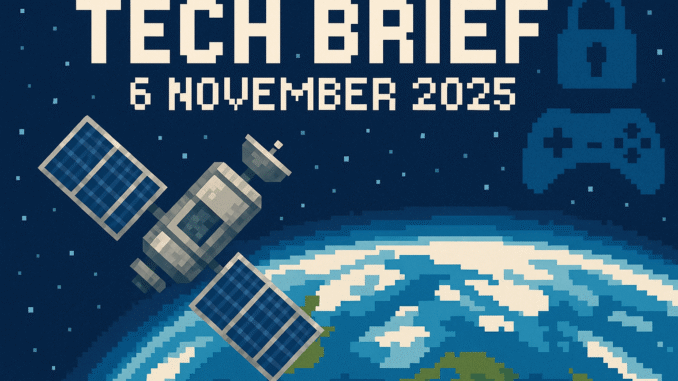
Tech Brief 6 November 2025 arrives just as British banks rethink cloud disaster plans, kids fall out with Roblox, and the world’s datacentres eye low-orbit satellites. This edition jumps from high-stakes retail hacks to the warm whirr of hard drives older than most of our passwords.
Missed yesterday’s Tech Brief? Catch up here before diving in.
M&S Cyberattack Triggers UK Retail Data Review
A cyberattack targeting Marks & Spencer has put the spotlight on cybersecurity gaps in the British retail sector. Computer Weekly reports the breach hit M&S’s HR systems, exposing sensitive data on 600,000 staff across the UK. That’s more than just a headache for spreadsheet warriors: it’s HR teams, payroll admins, and a whole lot of anxious email chains.
For a company whose earliest tills were once mechanical wonders, the pivot to digital risk lands heavy. Now, British retailers face calls for mandatory cyber drills and legacy IT audits. According to insiders, the attack leveraged a forgotten admin account traced back to a 2002 server migration. The story isn’t just about lost data; it’s a warning for any business that’s patched over seams with hope and hastily written scripts.
How many more “undocumented” systems are left blinking under desks, ready to trip us up?
Roblox Faces Scrutiny Over Children’s Digital Safety
What happens when a global gaming giant leaves digital safety to chance? That’s the question now facing Roblox, which stands accused of inadequate protection for young users. The Guardian details how parents and campaigners have raised alarms about in-game harassment, exploiting loopholes in content moderation and platform controls.
Roblox’s defence rests on AI moderation tools and layered reporting systems. However, critics point out that under-16s can still stumble into unsuitable spaces with a single mis-click. The platform’s community rules read like the ZX Spectrum BASIC manual: clear to experts, baffling for most. That undermines efforts to protect vulnerable players.
From Amiga BBSes to today’s virtual playgrounds, safety remains a moving target. If games are social lifelines, how do we balance connection and caution when the lines keep blurring?
Google Tests Space-Based Data Centres for Cloud Expansion
Google’s latest cloud experiment is launching data centres into actual space. Satellites fitted out as remote server farms could soon orbit above the UK, promising lower latency and greater network resilience. The Guardian explains that these orbital nodes are designed to process critical data loads independently, rerouting traffic on earth in milliseconds.
Industry analysts compare this to the mainframe leaps of the 1980s, where once-massive storage rooms found ways to shrink without compromising on power or scale. As covered above, the need for robust security rises with every new edge location, especially given recent retail security scares.
Will UK businesses trust their payroll or customer data to a satellite whizzing over Brighton? Maybe if uptime trumps familiarity. No one’s mentioned re-entry warranties yet.
From the Wayback Machine
On This Day: 1980 – IBM launches the 3380 hard disk, crossing the 1GB threshold for the first time. Each 3380 weighed more than two Amstrad PC cases and cost enough to buy a Brighton flat, at least back then. Its complex voice coil actuators and servo technology set the standards for reliability, influencing the disks now humming quietly in our USB adapters and NAS drives. No amount of cloud PR can beat the feeling of hearing a real head-seek.
Today’s Big Question
Does Tech Brief 6 November 2025 make you want to hug your old backup drive, or go full “off-grid” with stacks of floppies and a fresh tape reel just in case? Progress is brilliant, but sometimes, a mechanical whirr beats the faint buzz of an orbital node.
Take a moment for your retro roots, then double-check your own forgotten admin accounts. You never know what’s blinking in a cupboard.
Missed yesterday’s Tech Brief? Catch up here

Leave a Reply